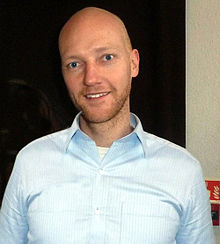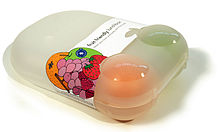- Mark Champkins
-
Mark Champkins (born 25 April 1977), is a UK designer and inventor, who gained public recognition after successfully participating in the BBC television show, the Dragons' Den. In 2011 he became the London Science Museum's first "Inventor in Residence".
Contents
Background
Champkins studied Manufacturing Engineering at the University of Cambridge, and Industrial Design Engineering at the Royal College of Art (RCA) in London.[1]
Whilst at the RCA, Champkins designed a range of Self-Heating Crockery making use of the Phase Change Material Sodium Acetate Trihydrate. The crockery enable users to instantaneously heat plates, cups and bowls to sixty degrees Celsius, by pushing a button that started a phase change reaction within the crockery. The items could be recharged and reused by washing them in hot water or a dishwasher.
In 2002, the crockery design was Awarded British Invention of the Year and featured on a number of TV science programs such as BBC Television's Tomorrow's World,[2] the Discovery Channels' 'What's the Big Idea',[3] and the CNN News.
After graduating from the Royal College of Art, Champkins worked at The Helen Hamlyn Research Centre as part of a twelve month research project, to investigate how good school design can improve standards of education in the UK.
In 2004, Champkins won a business award from NESTA[4] and founded Concentrate Design, a company that develops products intended to help pupils to concentrate at school.
In 2007, on the Dragons Den, Champkins won investment of £100,000 from Peter Jones in return for a 40% stake in Concentrate Design.[5]
In 2011, Champkins became the 'Inventor In Residence' at the London Science Museum, with the aim of creating a renaissance in invention and engineering in Britain.
Design Work
Champkins has been responsible for designing and launching a number of products intended to enhance the concentration of pupils at school. The products aim to help pupils focus in the classroom by ensuring that they stay hydrated, eat healthy food, sit comfortably and are in the best state to learn. The products include;
The Bottlecoolerpenholder; a thermally insulating wet-suit style jacket for water bottles, which stores stationery and acts as a reminder for children to drink plenty of water during lessons. The Chairpadbag; a bag that doubles as a padded seat cover, to make hard plastic chairs more comfortable. The Food for Thought Lunchbox; which encourages children to eat more fruit and the Lunchbox Cooler; a thermally insulating bag that ensures that the contents of a lunchbox stay cool and palatable before eating.
Other products include a USB stick in the shape of a brain which lights up with a brightness corresponding to according to how much data is on it, DIY Reflective Stickers that pupils can cut out and customize their bags, bikes or scooters with, and a range of Anti-Smell Sports Bags, which contains a charcoal odour absorbing patch, to ensure sports kits left at school remains as fragrant as possible.
In 2008, Champkins released a number of more tongue-in-cheek products, including a Voting Ruler, with which pupils can vote 'yes' or 'no' by holding the appropriate end, coffee Mugs of Authority which allow teachers to silently communicate with their pupils phrases such as 'Put That Down' and 'Stop Doing That' as well packs of Pre-chewed Pencils.
The Pre-chewed Pencils caught the attention of bloggers, leading to an appearance on Chris Evans BBC Radio 2 drive time show to explain the invention.[6]
Champkins also provided design input to Joshua Silver's Adaptive Spectacles and Imperial College's Body Sensing Network, both of which promote well-being and education.[7]
Books
In 2011, Champkins wrote "The Big Book of Celebrity Inventions", published by HarperCollins, describing the inventions that prominent public figures have either patented or would love to see. These include shoes patented by Michael Jackson's, a drum tuning device invented by Marlon Brando, and Tony Benn's "Seatcase". Other public figures featured in the book include Jamie Lee Curtis, Charlie Sheen, Harry Hill, Karl Pilkington, Nicola Roberts, Jamie Oliver, Paul Smith and Margaret Thatcher.[8]
References
Categories:- British inventors
- Living people
- 1977 births
Wikimedia Foundation. 2010.


